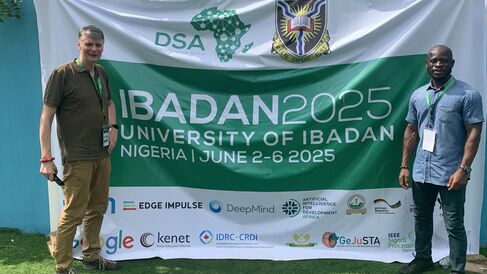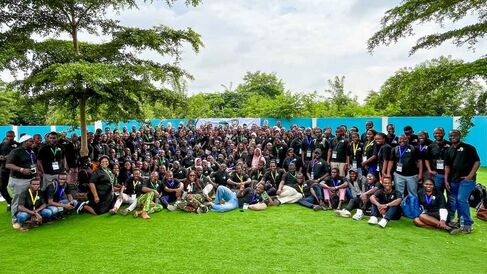
The following blog is written by Dr Adeleke Bankole. Adeleke is a research software engineer at the ICCS specialising in computational methods for fluid dynamics.
In June this year, ICCS's Research Software Engineer (RSE) Dr Adeleke Bankole was invited as a speaker at the yearly Data Science Africa (DSA) Summer School and Workshop in Ibadan, Nigeria, from 2-6 June 2025.
DSA is a grass-roots organisation aimed at providing quality training in data science, machine learning, and emerging technologies with the goal of solving problems relevant to the African context. DSA's purpose is to empower a community of practitioners working in data-centric technologies for African solutions.
The summer school is aimed at training participants: graduate students, researchers, professionals working with large-scale datasets on the theory and practice of machine learning, followed by workshops where researchers present work that leverages data science to solve problems. DSA aims to guide activities including capacity building, resource mobilization and the expansion of the African data science community by engaging with stakeholders.
Adeleke contributed in the Summer School track, presenting on "Introduction to version control: Git and GitHub." He explained how to use this software tool efficiently and emphasised best practices, reproducibility, accountability with version control for collaborative machine learning research workflows. They went through basic git commands to more advanced commands and saw how GitHub can be efficiently used for project management. In the workshop track, he moderated sessions about AI in Climate, AI in Agriculture, and AI in Education.
Adeleke travelled to Ibadan, Nigeria with Prof Neil Lawrence, Professor of Machine Learning at the University of Cambridge and author of the thought provoking book, "The Atomic Human: Understanding Ourselves in the Age of AI." Neil is one of DSA's advisors; he was a keynote speaker, and his great speech centered around topics explored in his book. He emphasised how leaning too much on technology could weaken our ability as humans to think clearly, and challenged participants to build quality software to solve problems.

Adeleke reported that his experience at DSA in Ibadan, Nigeria was extremely positive. The meeting brought together participants from over Africa working on data-centric problems, strengthening ties, building collaborations, paving the way and fostering new ideas towards future work.
Our sincere thanks to the AI for Environmental Risks leadership for supporting Adeleke’s attendance at DSA 2025.
